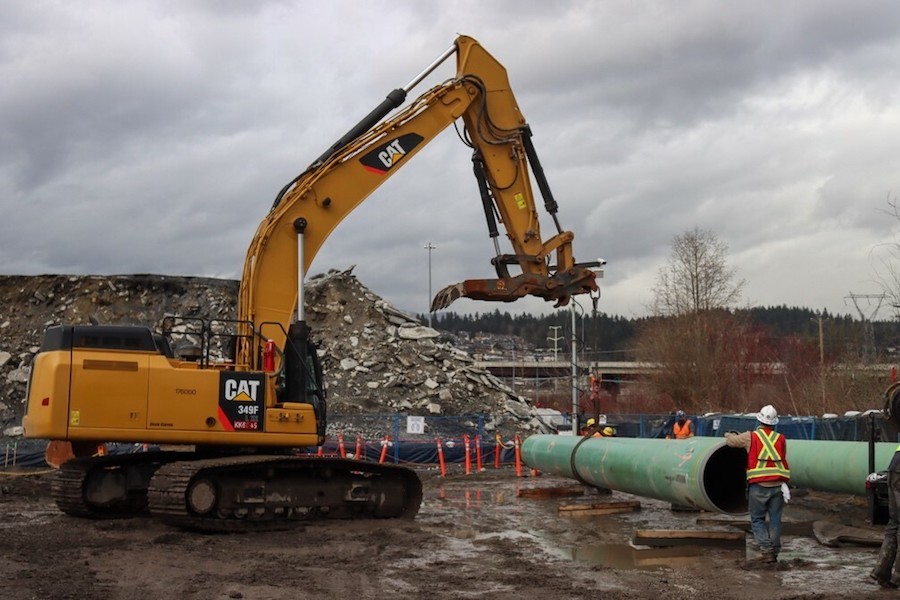Alberta’s construction market, hard hit by COVID-19 and a longer-term decline in once-booming oil and gas work, is showing signs of a turnaround.
The evidence is not just in industry employment numbers that have stabilized Canada's provincial energy core after a rough few years of plunging markets followed by the pandemic, but also in the flood of workers into Edson, a town about 125 miles west of Edmonton where three major oil and gas projects, despite bumps and growing opposition, are moving forward nearby.
As many as 2,500 additional construction workers have come to the town of 8,400—booking up area hotels, taking rental properties off the market and even renting rooms from local families, says Karen Spencer-Miller, president of Edson’s chamber of commerce and a local real estate broker. “Right now, we have workers here from across Canada,” she says.
Among the three project draws is the $10-billion Trans Mountain oil pipeline expansion—which accounts for roughly half of the workers. The project involves twinning the 1.150-km line between Strathcona County and Burnaby, B.C. on the Pacific coast, which is set to boost capacity from 300,000 to 890,000 barrels per day.
Trans Mountain is owned by the Canadian federal government, purchased for about $4.5 billion in 2018 from energy firm Kinder Morgan to propel completion of the expansion, held up by permitting issues.
The expanded line was set to become operational in December 2022, but construction was interrupted in November and December 2021 after epic floods in British Columbia forced diversion of some contractors and workers from expansion work to repair of the existing line, which was shut down for three weeks. It restarted on Dec. 5 at reduced pressure and is not expected to resume full capacity until late January.
Still on Track?
According to a recent quarterly financial report last year from Canada Development Investment Corp., the government corporation responsible for Trans Mountain Corp., 37% of line construction is complete. In total, $7.2 billion has been spent on the expansion, the financial report said. In a December 2020 document, government budget officials warned the project could face more delays and cost escalations.
Trans Mountain officials did not say in the financial report if the December target will be met or extended, nor disclose any projected cost hikes.
Despite rising expansion protests from indigenous communities and other project opponents, Trans Mountain provides about 90% of the fuel needed in the most heavily populated Lower Mainland of B.C., including the Vancouver metro area, and supplies refineries in Washington State.
But corporation officials said in early January that more expansion completion delay could come from expected route design changes because of the flooding.
Other workers have been drawn to Edson by work on the NOVA Gas Transmission Ltd. (NGTL) expansion project, an estimated $1.83 billion project underway for a unit of TC Energy Co.The project would add about 344 km of 48-in.-dia pipeline to the existing line in northern Alberta, as well as three compression units and related infrastructure.
Construction got underway in early 2021.
The third megaproject is the $1.2-billion Cascade Energy power plant, a 900-MW combined-cycle natural gas-fired power generation facility being built in Yellowhead County, about 12 km southwest of Edson, that would have the capacity to supply more than 8% of Alberta's average electricity demand.
The plant is set to operate in 2023.
Despite the churn in rental properties as workers come and go, the overall vacancy rate hovers around zero, said Henry Boxma, another Edson real estate broker. Monthly real estate rentals at the top end of the market scale have nearly doubled,
Industry Employment Rising
Alberta saw construction employment rise 0.8% in November, one of only three provinces—the others being Ontario and Nova Scotia —to report gains instead of losses.
BuildForce Canada, which tracks national industry workforce trends, last year forecasted an 11% jump in construction employment in Alberta by 2030, with 19,000 industry jobs to be added.
Canada’s construction payroll expanded 1.6% in 2021, adding 23,200 workers, but still remains below what it was in 2019, when industry employment across the country hit record levels.
“We think we have reached a trough at this point,” said Bill Ferreira, BuildForce Canada executive director. “We do see stability returning to the market and we do anticipate that 2023 will be above 2020 levels.”






